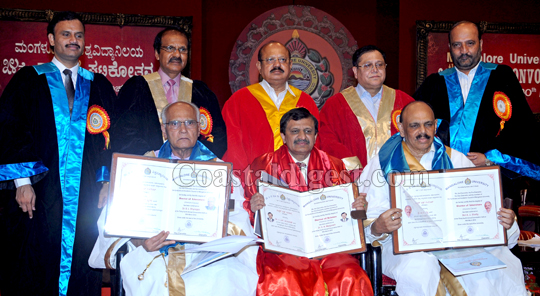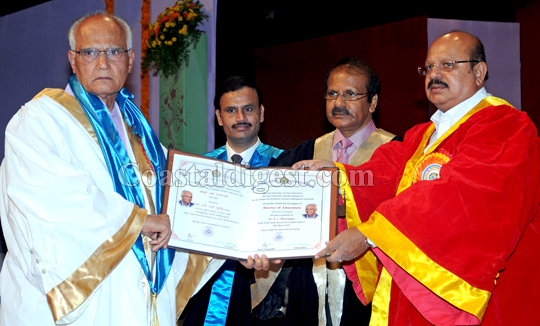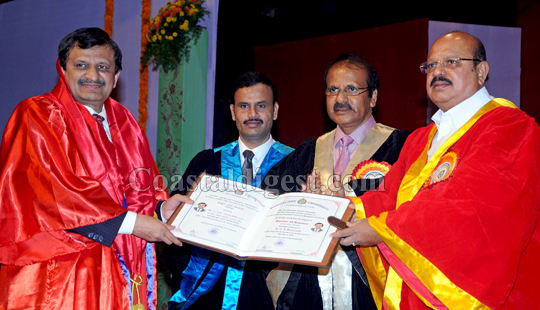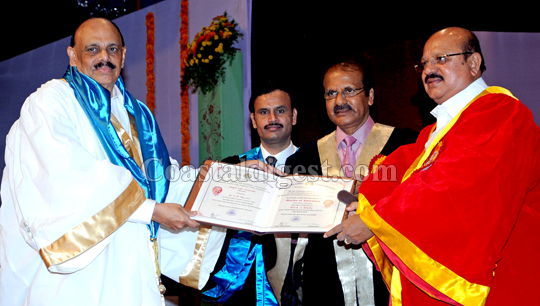Mangaluru, Mar 30: Two controversial personalities and a cardiovascular surgeon were honoured with Honoris Causa (honorary doctorates) during the 34th annual convocation of Mangalore University here on Wednesday.

Kannada novelist SL Bhyrappa, who is known for promoting Hindutva and spreading the misconception about Muslims and Islam, Mangaluru based entrepreneur AJ Shetty, who is known for liquor business are the two controversial figures, who received the degrees today. The third recipient of the Honoris Causa is Dr CN Manjunath, the director of Sri Jayadeva Institute of Cardiovascular Sciences and Research in Bengaluru.
Speaking on the occasion Dr Bhyrappa said the DLitt degree was a special honour as it was a recognition from the people's university.
“At a time when there was lack of facilities, Dakshina Kannada was a forerunner in education, health, banking, administration and other fields. In spite of the region not being bestowed with natural resources, it has progressed in all spheres of life with the entrepreneurship skills of its people,” he said.
“This is the land of stalwart writers, like Manjeshwara Govinda Pai and Sediyapu Krishna Bhat, and where the Kannada literature thrived. Apart from this, the land has contributed to culture thro-ugh Yakshagana. The district is also close to my heart as it has supported me as an author by encouraging all my writings,” he said.
Dr C N Manjunath said that the DSc is a recognition to his service to the society. “At Jayadeva Institute, we offer best medical facilities to people in a government set up. The Institute offers the highest number of cardiac beds – 1,150 – for people, as compared to any other cardiac institution in the country,” he explained.
A J Shetty said that the DLitt degree is recognition of his service to the society, poor patients. “Through my institutions, I want to work for deserving sections of the society,” he stated.
About SL Bhyrappa (DLitt)

Dr. S.L. Bhyrappa is a novelist in Kannada having written more than 25 novels which have been translated to several languages such as English, Hindi, Sanskrit, Marathi, Urdu, Gujarathi, Telugu, Bengali and Tamil. Some of his novels have the unique distinction of seeing as high as 48 reprints within a short span of time after publication. A few of his novels are also adopted for film making.
Dr Bhyarappa has been decorated with a large number of awards and recognitions from several Universities as well as the Padmashri by the President of India. He is one of the eight national professors in the country appointed by the Government of India.
About CN Manjunath (DSc)

Dr. C.N. Manjunath, Director, Sri Jayadeva Institute of Cardiovascular Sciences and Research at Bengaluru is a renowned cardiovascular surgeon who has developed the institute into one of the largest heart care destinations in the world. He has expanded this heart care services to remote areas of Karnataka. Dr. Manjunath, has the distinction of training American, British, Chinese and French Cardiologists on balloon valvuloplasties at his Institute.
Dr. Manjunath has been instrumental in mobilizing an amount of Rs. 25 crores from charitable and philanthropic organizations to establish a Poor Patients Corpus Fund. He is also instrumental in conducting about 1000 open heart surgeries for needy patients with the support of charitable and philanthropic organizations.
In recognition of the outstanding medical/public services, Dr. Manjunath has been conferred with a large number of awards including Padmashree by the President of India. He is a Fellow of American College of Cardiology. Recently Dr. Manjunath has received the prestigious Millenium Plaque of Honour by the Prime Minister of India.
About AJ Shetty (DLitt)

A. J. Shetty, Chairman, A. J. Group of Institutions and President, Laxmi Memorial Education Trust, Mangalore is a well-known entrepreneur who has established small scale industries to manufacture automobile spare parts, cashew products to cater to the local needs. These industries have helped in creating jobs to large number of poor and needy persons of this area.
Under the education trust, A J Shetty is running many institutions especially in the field of medical sciences and allied fields. The hospitals established by him are providing medical treatment and medicines freely to large number of poor patients every day. He has taken a lead in providing free health care services to the rural population in the neighbourhood. He is managing a few charitable organizations like orphanages and old age homes.
A. J Shetty is also responsible for establishing cancer centre that treats about 100 patients per day at affordable cost. He is also promoting the local cultural heritage by encouraging Yakshagana as President of Dakshina Kannada Yakshagana Association. A J Shetty, is a recipient of many awards including National Corporate Excellence Award, New Delhi.







Comments
Yes Prasanna Anna your are fantastic Evaluator, Hopefully Master Bayrappa no Good What About Liquor Don??? is it ok Anna!!!!!!
Why all these PHD's to these fellows Money makes anything Anna.
For ,Dr.Manjunath and A.J.Shetty O.K., but why for Byrappa? The hate monger will spread more poison with a new Doctorate
Add new comment